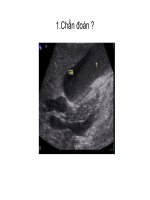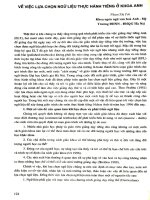ngữ âm thực hành 2
Bạn đang xem bản rút gọn của tài liệu. Xem và tải ngay bản đầy đủ của tài liệu tại đây (2.67 MB, 66 trang )
NGO QUYNH HOA, M.A
Course Outline
ENGLISH PRONUNCIATION
PRACTICE 2
Units of credit
2 (30 periods)
Suggested self- study 90 periods
Instructor
NGO QUYNH HOA
Contact details
Cell phone: 0983791306
Subject
Course Description
This course designed to help the students more
accurately reproduce pronunciation features of English
through the use of intensive pronunciation drills,
listening activities and guided conversation practice.
Speech awareness and self- monitoring of
pronunciation will be emphasized. The features
include syllables, word stress , sentence stress and
intonation.
Learning Goals
By the end of the course, students will be able to:
Demonstrate increased intelligibility, accuracy and
fluency in speaking English.
Demonstrate the ability to link sounds at the beginning
and end of words, contractions, and assimilation of
sounds.
Demonstrate increased ability to self-monitor and
correct his/her own pronunciation.
Assignments
Students will take written & oral exams, participate in
small group activities, and do homework records.
Grades will be assigned according to the following
percentages:
Assignments
(a)
Class
attendance
(b) Oral
presentation
(c) Participation /
small
group
activities
(d) Mid – term
tests
(e)
Final Exam
Required
assessment
(> 2 absences in
the
tutorial
sessions: FAIL)
Required
assessment
Required
assessment
Required
assessment
Required
assessment
Yes
10%
Yes
10%
Yes
15%
Yes
15 %
Yes
50%
Proposed schedule
Time
Week 1
Week 2
Week 3
Week 4
Week 5
Week 6
Week 7
Week 8
Week 9
Week 10
Week 11
Week 12
Week 13
Week 14
Week 15
Contents
Course introduction
Part 1: Syllables
Part 1: Syllables (cont.)
Part 2: Word stress
Part 2: Word stress (cont.)
Part 3: Sentence stress
Part 3: Sentence stress (cont.)
Part 4: Linking
Part 5: Emphatic stress (cont.)
Part 5: Emphatic stress (cont.)
Part 5: Emphatic stress (cont.)
Part 6: Intonation
Part 6: Intonation (cont.)
Part 6: Intonation (cont.)
Revision
Textbooks & References
English Pronunciation in Use – Intermediate (Mark
Hancock – Cambridge University Press)
Elements of Pronunciation (Colin Mortimer Cambridge University Press)
Sounds English (J.D,O’Connor & Clare Fletcher –
Longman)
English Pronunciation in Use – Advance (Mark
Hancock – Cambridge University Press)
NGO QUYNH HOA, M.A
CONTENTS
Introducing syllables
Consonants at the start of syllables
Consonants at the end of syllables
Plurals & other –s endings
Past tense endings
INTRODUCING SYLLABLES
A syllable is a group of one or more sounds.
The essential part of a syllable is a vowel sound (V).
A syllable can have consonant sounds (C) before V,
after V or before and after V.
Note: letters are not the same as sounds
The word “syllable” is used to talk about pronunciation
of words, not the writing
Consonants at the start of syllables
Some one-syllable words are just a single V.
oh
eye
If we add one or more C to the beginnings of these
words, they are still only one syllables.
no
lie
snow
fly
Consonantstwo Cs at the start ofof syllables
at the start a syllable:
When there are
If the first C is /s/, the second C can be any of these: /f/,
/k/, /l/, /m/, /p/, /t/, /w/, /j/
If the first C is any sound other than /s/, the second C
can only be one of these: /l/, /w/, /r/, /j/
When there are three Cs at the start of a syllable:
The first C is always /s/
Consonants at the start of syllables
For example:
o /s/ + C: spell
stairs; sleep; small
o C + /l/, /r/, /w/, /j/: blue
swim dress view
o /s/ + CC: spring strange
scream
o If you add a V before the first C, you may get a different
word: sleep asleep
o If you add a V between the Cs, you may get a different
word: sport support
Consonants at the END of syllables
Some one-syllable words have no C after V. If we add
one or more C to the end of these words, they are still
only one syllable.
go
goal
gold
If you do not pronounce the last C, you say another
word. It is important to pronounce the final Cs.
belt
bell
help
hell
Plurals & other –s endings
Add –s to make plural nouns, the third person singular
present, or the possessive not change the number of
syllables of the words.
go – goes
cat – cats
Tom’s cat
Sometimes, plural, third person and possessive
endings are another syllable when the original word
ends in one of sounds below:
/s/, /z/, /tS/, /dZ/, /S/
Chris’s kisses, Trish’s wishes, Rose’s roses, the witch’s
watches, George’s fridges
Plurals & other –s endings
Note: Try to make sure you pronounce the –s ending. It
is very important to the meaning.
Noun
Verb
Jane’s nose Jane knows
Nick’s weights
Nick waits
Past–ed or –d to make past tense not change the
tense endings
Add
number of syllables of the words.
arrive
arrived
play
played
If the infinitive of the verb ends the sounds /t/ or /d/, ed or –d is a new syllable. The letter E is pronounced as
a V.
rent
rented
hate
hated
need
needed
Past tense endings
Past tense endings tell you if the sentence is present or
past.
You never cook a meal. (present
You never cookED a meal. (past)
Ngo Quynh Hoa, M.A
Introduction
If the word has more than one syllable, give stress to
one of the syllables.
To give the syllable stress:
Speak longer
Speak louder
Speak higher
Introduction
We can show stress with circle
0oo
Saturday
Different words have different stress patterns (patterns
of stressed and unstressed syllables).
Stress patterns can help you hear the difference
between similar words.
thirteen
thirty
record (verb)
record (noun)
Stress patterns
0o
Table
Language
Window
Teacher
o
0
Begin
Arrive
Select
Around
0oo
Happiness
Melody
Bicycle
Hospital
o
0o
Discover
Example
Romantic
Election
Stress in two-syllable words
Nouns & adjectives: Oo
Verbs: oO
Note: there are a number of exceptions
asleep, mistake, machine, etc.
answer, enter, offer, happen, etc.
Some words are both nouns and verbs
Stress in two-syllable words
Nouns
Record
Contrast
Desert
Export v
Object
Present
Produce
Protest
Rebel
/`rekO:d/
/`kQntrA:st/
/`dez@t/
/`ekspO:t/
/`QbdZIkt/
/`preznt/
/`prQdju:s/
/`pr@Utest/
/`rebl/
Verbs
/rI `kO:d/
/k@n `trA:st/
/dI `z3:t/
/Ik ` spO:t/
/@b `dZekt/
/prI `zent/
/pr@ `dju:s/
/pr@ `test/
/rI ` bel/









